#adult onset depression
Text
Can Creativity Help You Heal Depression? An Interview with Psychiatrist, Dr. Carrie Barron
Dr. Carrie Barron is a board-certified psychiatrist on the Columbia College of Physicians an Surgeons clinical faculty who also has a private practice in New York City. She has published in peer-reviewed journals, won several academic awards, and presented original works related to creativity and self-expression at national meetings of the American Psychoanalytic Association. Along with her…

View On WordPress
#adult onset depression#BigLaw#Coping Skills#creativity#Dan Lukasik#depression#Happiness#Hobbies#Law firms#Lawyer optimism#Lawyers#Legal profession#major depression#mental health#mental illness#nature#Optimism#sadness#The Creativity Cure
0 notes
Text
There's this idea, fairly common in society, that mental illness is for teens and up. Children are happy little creatures, generally, right? Sometimes they're abused and the trauma can make them mentally ill, but that's not common.
There are two fundamental problems with this attitude. One, it's incorrect to assume that trauma is the only reason a young kid can be mentally ill. Two, trauma is more common than people think. I'll be covering the first problem in this post through the lens of my particular experience.
Where I live, you can be diagnosed with bipolar disorder at 18 years old. You cannot be diagnosed with bipolar disorder as a minor. This poses a problem because my age of onset was in first grade, roughly six years old. Because of the fact that I was very young and new to the world, this was also the age of my first suicide attempt. Thinking I wouldn't be able to pass a spelling test genuinely felt like something worth trying to die over. So, I ate some hemlock, since I'd read about Socrates being killed with it. Luckily, I ate western hemlock, an unrelated species, and just felt kind of sick.
I'm not recounting that for fun or pity. I'm recounting it because children with mental illness are in genuine danger because they have little to no experience with managing their emotions, have little to no concept of the idea that their life can change and improve, and are dismissed by adults. I told a teacher that the test made me want to die, though not that I'd attempted to, and it was brushed off as little kid hyperbole. If I had used a method that was effective rather than one I thought would be, I would have been dead at six years old.
I would not receive medication that worked even a bit for another two years. I would not receive treatment for bipolar disorder specifically for ten years, and that required my PCP fudging the reason for the medication because she was afraid I would die if she didn't, and diagnosis was still two years off at minimum. I received a formal diagnosis at age 19, thirteen years after onset.
But surely that's uncommon, right? This story is a huge edge case, right? I actually have no idea, because age of onset and age of diagnosis are massively conflated for most disabilities. Policies like the one in my area that restricted bipolar diagnoses by age can artificially raise the age of "onset", in my case by thirteen years. The general idea that children are somehow immune to mental illness can also delay diagnosis by several years, perpetuating the idea that young children can't be mentally ill. The data on when people start experiencing mental illness is inherently skewed upwards, and I frankly don't have a good estimate on how bad that skew is. If anyone does have that data, please chime in.
Listen to children. If they're saying they're sad all the time, that they don't care about anything, that they don't see a future for themselves, those are signs of depressive symptoms. If they say that tests make them feel sick, that they can't do anything because they're scared, that they can't breathe and freeze up, those are signs of anxious symptoms. Many children talk about imaginary things, and that's just fine, but slip in a question or two about them to make sure that the kid is just playing, and not experiencing psychosis.
Children are new to the world and vulnerable, and they don't know what's normal and what isn't. They need people who are more experienced watching out for problems they might be having, and listening when they talk about having problems. If you can, try to be the person who perceives them, and tells them that things can be better.
5K notes
·
View notes
Text
The idea of transgender “social contagion” was first proposed in a 2018 paper by Dr. Lisa Littman, a researcher who has pushed the theory heavily. The article, entitled “Rapid-onset gender dysphoria in adolescents and young adults: A study of parental reports,” proposed that social contagion was leading to an increase in trans identification. To support her claim, Littman solicited interviews from anti-trans websites such as Transgender Trend and 4thWaveNow. She used data from those interviews to claim that transgender youth “suddenly” develop gender dysphoria through a process known as “Rapid Onset Gender Dysphoria.”
Her paper was immediately withdrawn with an apology by the journal for correction after the data collection methods were revealed, with the republication stating that the research “does not validate the phenomenon” of transgender social contagion.
"Rapid Onset Gender Dysphoria" is derived from interviews with parents who report their children "abruptly came out as trans" without any forewarning. For numerous parents on these websites opposed to transgender rights, they claimed their children’s coming out was too sudden to be genuine. Coupled with conservative media exposure asserting that being transgender results from factors ranging from TikTok to alleged "grooming" in schools, parents frequently sought alternative explanations for their children's trans identification, instead of acknowledging the possibility that their children were authentically transgender.
A pivotal study published in The Journal of Pediatrics in 2021 entirely debunked this concept. Professionals who work closely with transgender populations frequently observe that individuals harbor dysphoria for an extended period before revealing their feelings to loved ones. Upon coming out, these individuals often swiftly embrace their transgender identity, motivated by the liberation that comes with acknowledging one's true self. To determine whether transgender identification is genuinely "rapid," researchers sought to pose a direct question to transgender teenagers: How long have you known you were transgender?
The results were stunning. Transgender teens knew they were trans for an average of 4 years before coming out as trans and getting their first clinical visit.
The study did not stop there, however. It also analyzed the few transgender teens who indicated their gender dysphoria realization was more recent. It found no linkages among those groups with depression, online support, having transgender friends, or any other proposed mechanisms for “rapid-onset gender dysphoria.” To put it simply: transgender people often know they are trans for a long time before coming out, and having transgender friends does not influence you to “become transgender.”
514 notes
·
View notes
Text
There's this phenomenon bunnies can have called False Pregnancy. Imagine it in an a/b/o setting.
The Omega nests, at first like normal, but it becomes more extravagant. There's a little den part where they'll have their pups. The Omega refuses to stop until it's absolutely perfect.
Despite this, there's no signs of pregnancy. They aren't. Yet the Omega "knows" in their gut that they're about to have pups. They grow stressed, chewing, even biting at anyone who isn't their alpha.
Eventually, the feeling will pass, and depression can onset. Similar to post partum. It'll take some time, they'll most likely just stay in their nest and only want to be seen by their alpha and very very close friends/family.
Mother bunnies always worry for their omegas about this happening, because it's rather common. There's plenty of books on it, like picture books and such (and non for adults), and the community is pretty well aware. It's diagnosable by doctors so pack members can be excused from school, work, or other events.
Just some thoughts
#world building#nesting#miscecanis#my alpha#miscecuniculus#miscecuniculus lifestyle#mega mates#misceanimalis#a/b/o lifestyle#omegaverse#a/b/o#bunny alpha#alpha beta omega dynamics#alpha/beta/omega#alpha beta omega#bunny a/b/o#a/b/o dynamics#bunny omega
231 notes
·
View notes
Text
Hello Sunset - 3
AN: I actually managed to write this chapter quite quickly. It was originally longer but I've decided to break them into two chapters so it flowed better. The pacing of the story is still slow for now as we slowly get to know Y/N and the history of her relationship with S.Coups. There likely won't be an update this weekend and the next update won't be till the weekend after. As always, I would love to hear people's thoughts on the story. Anything you'd like to see?
PAIRING: Seungcheol x fem!reader
GENRE: exes to lovers, idol verse, angst
WORD COUNT: 2,918
WARNINGS: reader has anxiety and depression, swearing, mentions of alcohol
PREVIOUS / NEXT
After texting Rachel to not bother and that she’s going straight to bed, Y/N draped herself over the couch in her living room. She felt like she’d aged 10 years after this one day and couldn’t quite bring the energy to wash up and change into her pyjamas yet.
“Alexa, dim the lights.”
The brightness decreased and the dullness of the light eased the onset of a migraine Y/N had sensed since she’d left Sian’s office. The office was a scenic walk from her apartment in Central London and any other day, Y/N would have walked the 50 mins from Kensington Arcade but today, she couldn’t fathom an extra minute outside the safety of her flat. This was her safe place. She wasn’t so famous that the paps cared about her and she definitely wasn’t the richest or even the most famous person on her street. The place gave her a sense of calm she couldn’t quite get at home and it’s why she hadn’t made her way back to the house in Kingston, especially with her parents there. She couldn’t even imagine going back to the house and facing the questions from her parents. She didn’t have the fight left in her to hear their accusations and the emotionally charged words that pierced her confidence till it all seeped out.
She’d been planning to admire the sunset tonight, enjoying a drink on a rooftop bar whilst basking in the dying embers of the evening sun. Instead, she was drowning in her misfortune and wishing she could spin the clock backwards by two years to the summer of 2023. Maybe she was better off with music just as her hobby. Sure, she wouldn’t have experienced so much of the joy she’d come to know, the love of strangers bonded with her music, the luxuries she’d become accustomed to including the very flat she was currently and much more. But she also wouldn't have experienced the heartbreak she’d felt and was still left keeling over.
With strict parents who cared more about success and reputation more than their children living and learning from life, she’d never really encountered love or interacted with the opposite sex in a romantic manner till she’d escaped the clutches of her parents and landed in university. The men she met were at the beginning of their youth and weren’t looking for the commitment and the same things she’d wanted in a relationship. She’d cried tears in frustration then but now looks back and laughs at her younger self, so naive in thinking she had everything figured out. It wasn’t all bad. She’d experienced butterflies at first sight, library dates like the ones she’d admired in books, the passion of her youth with every emotion fully felt and overwhelming and so very wonderful. She’d learnt a lot about herself, learnt what she wanted out of a bad partner, which habits grated on her nerves, especially in a boyfriend, and she’d also unlearnt some of her own bad traits.
After the short courtships and immature versions of a relationship, Y/N had turned her focus to her career. Entering the working world was when she truly began to feel like an adult. At first, it didn’t seem so different from when she would pretend as a child that she was a grown up, wearing her mother’s heels that were too big for her child-sized feet and dragging her handbag, shouting I’m off to work like she’d seen on TV. She’d felt small in the workplace, a cog in the machine and until she’d started to witness the impact of her work, she’d felt unsure of her place. Just when she’d started to feel comfortable in her own shoes, the pandemic had happened. The first year was horrible; there was no other way to put it. Y/N was sure many had felt the same as her then. Being in lockdown with no social life and just her parents for company didn’t help. Her relationship with her parents got worse. Every little thing was exacerbated and she was ready to pull her hair out. The only thing that gave her peace was music. It was a way to relax at the beginning. She’d recorded songs for fun, just like she had when she was young, only this time they were songs of her own creation. She’d gathered a small following on YouTube by the end. She started by playing small gigs on the weekends and people would actually pay to see her. Her time had been limited and she had been too scared to take the leap until Sian reached out. Since then, her life has been a rollercoaster. Meeting Seungcheol in the midst of all of this wasn’t in Y/N’s plans. She hadn’t been looking for a relationship. She definitely hadn’t thought she would be someone he would be interested in. Everything had moved fast in a whirlwind. It fit the theme of her life for the past two years.
Y/N wasn’t new to the South Korean entertainment world. She’d been an avid k-pop fan when she was younger, having been introduced to the music by Rachel when they’d first met each other in secondary school at the age of 11. In fact, the interest spurred her on to study languages, particularly Chinese, Japanese and Korean as her chosen course for her university degree. She’d dipped in and out of the music genre, keeping tabs on the groups she’d liked and her music taste broadening as she grew older, preferring solo artists more. She hadn’t quite kept on top of the new generations of idols and only knew some of them by name. SEVENTEEN was one she was familiar with and funnily enough, she’d only gotten introduced to them earlier that year by her friend, Eun Ji. Choi Eun Ji, Rachel and Y/N had been the eccentric trio back in secondary school, at least until Eun Ji moved back half way through to complete her studies in Seoul. Eun Ji had shared a clip of an episode on Going Seventeen and Y/N was trapped. She’d worked her way through their discography and found herself shaking with giggles every time she watched an episode of them on a variety show. She’d never had a big group of friends to rely on, Rachel, Eun Ji and a couple more being the ones she would call her true friends. It was healing to watch the band together, their bond settled her soul and she truly believed that you could find love and peace from strangers. The beginning of 2023 had been so unsettling and Y/N didn’t handle changes well. Having an extra set of friends, as she called them, who would always readily cheer her up and take her mind off the doubts that plagued her at night, was something she treasured. So, imagine her surprise when she met one of the people she admired.
27 September 2023
Y/N felt self-conscious in front of the cameras. This wasn’t her first press event, especially after the past two weeks of radio shows, tv guest appearances and live performances. She’d already been invited to Paris Fashion Week to view Marni Women’s SS 2024 show before everything had blown up. Sian had said maybe they had moved her up front a few rows, but that’s all it was so she had nothing to fret over. Y/N disagreed. She was sure she’d pissed off whoever it was that had been bumped off their seat at the very least.
Y/N knew nothing about fashion. She wore what made her feel good and she tried her best to support the right brands. She also didn’t know anyone here so she felt like the sole prey in front of a room full of predators. Despite all of that, she tried to put on her best smile as she posed in her Marni yellow stretch-crepe midi dress. As the flashes began to dwindle, she took that as her sign to move off towards the building when she heard her name called by someone.
“Y/N! Y/N, hold up!”
Her black boots came to a stop and she twisted her face to look behind her. It was Issa Rae. Issa Rae knew her and was calling her name. The actress was also dressed in yellow and looked stunning. She waved Y/N over saying, “The girls in yellow need a picture together. Come on!”
Y/N walked back over, trying not to stumble and embarrass herself in front of everyone. It felt like everyone was watching her now. After posing together for a few pictures, she graciously thanked the actress and stepped away, trying her best not to run away and hide in a bathroom stall somewhere. As they took the pictures, Issa had shared how much she’d enjoyed listening to Y/N’s music and how she’d been familiar with her song as it had been recommended to her by a friend when she’d visited London for the UK promotions for Barbie. She wasn’t used to the attention, let alone praise from famous people she’d only seen on TV or the internet and her face felt as if it was on fire. Thankfully, the make up and her skin colour hid most of this reaction.
Emma Stanley, Sian’s assistant and the person to usually join her at these events, joined Y/N and directed her inside to her seat.
“That picture was a great shout. Have you met Issa Rae before?” Emma asked as she walked in step with Y/N and handed her a bottle of chilled water. Y/N shook her head in response as she took the bottle and took a sip. The coolness helped hush the tension in her gut and she tried her best to breathe normally, focusing on the inhales and exhales. When she found her seat, she took her place and Emma sat beside her. The seating was arranged in one row so Y/N was relieved to realise Sian had been joking.
Emma browsed through the Calendar on her phone as she reminded Y/N of their plans for the rest of the day and the next few days in Paris. She was due to also be at the Victoria Beckham show on Friday and perform at the after party. She’d then attend the Vivienne Westwood show the next day before taking the Eurostar back to London. In between, she had interviews with magazines and would be working in between. Y/N had been taking unpaid leave to meet the demands of her schedules after she suddenly rose in popularity. Her manager and company had accepted things with grace, especially when she’d topped the UK Charts, ranking number 1 on the Sunday that had just passed.
A few moments passed as Y/N continued to take small sips of her water and restore her composure. A buzz in the air began as she saw more celebrities walk inside and she could hear the garbled shouts of fans outside. Usher walked in and a throng of people followed behind him. He walked in her direction and she realised he was most likely seated in the centre of the long walkway, which was a few seats away. As he neared her seat, she hesitated on what to do. What did people normally do in these situations? Should she get up and greet him? Should she pretend to be busy with something? Before she could decide, Usher’s long strides got him to her and he came to a stop, saying, “Y/N right?”
She half jumped up from her seat at his acknowledgment.
“Yes, that’s right. I’m a huge fan of your music!” Usher reached out for a hug that was slightly restricted by his outfit. He said he’d been really enjoying her latest song. To her surprise, he mentioned that he had checked out a few of her YouTube videos from when she was younger but hadn’t known that Y/N had made a return. He said he would love to speak to her more about her upcoming album plans. Emma, who had been listening at a distance, quickly slipped her card to Y/N.
“That would be my honour! I’ve actually been working on an album since the summer. I would love to get your thoughts on it. I think you might know my agent, Sian Doyle. She’s been talking about getting someone to co-produce it as some of the songs were written a while ago and need tweaking in style.”
Usher’s grin grew wider at Sian’s name and chimed that he knew Sian very well and that he knew her parents even better. He’d taken Emma’s card and passed it to his assistant but then proceeded to grab his phone and asked for Y/N’s number. She tried to keep her voice steady as she gave the information. After final pleasantries, Y/N thought he would keep walking to his seat but he had asked if she’d met the person sat next to her.
As she turned to her right to the direction Usher was looking at, she realised someone had arrived to take the seat next to her and it was Joshua Hong of SEVENTEEN. Her lungs had run out of oxygen and her mind had gone blank. What were the chances?! Emma subtly elbowed Y/N as Usher waited for a response.
“No, we’ve not met but I do know of him.” Usher turned to Joshua and waited for Y/N to say something but when she didn’t, he introduced himself.
Joshua had gotten up from his seat, realising the conversation was coming his way. He enthusiastically returned Usher’s greeting and chatted about the show.
“And this is Y/N. She said she knows you.”
Y/N broke out of her daze at the sound of her name and quickly collected herself. She stuck her hand out for a handshake and said, “Hi, I’m Y/N. It’s a pleasure to meet you. I love SEVENTEEN’s music and really respect your work as an artist.”
Joshua smiled at this and thanked Y/N. The three of them continued speaking for a few minutes before they all received the signal to take their seats.
Y/N sat back down at her seat, playing nonplussed at being at close proximity to one of Kpop’s most handsome idols. She admired the colourful patterns of the show and made note of clothes she could see herself wearing, chatting to Emma about them. Joshua leaned over a couple of times to ask her thoughts. At the end of the show, they naturally gravitated towards each other as they moved towards the post show reception.
Feeling more relaxed now, Y/N loosened up and was chirpier.
“I didn’t want to embarrass myself in front of Usher earlier, but I’m actually a CARAT, albeit a baby one, so I’m pretty proud of myself for keeping it together!”
Joshua laughed at this and returned the compliments saying he'd really liked Y/N’s song ‘Stripes’ but he was too shy to say anything. The two stayed close to each other in a room full of strangers but made the effort to network and speak to others before returning to each other and swapping notes. By the time they were ready to leave, the two felt like this was the beginning of a good friendship. The two swapped numbers and Joshua was pleasantly surprised that Y/N had the LINE app so they could easily stay in touch. Y/N explained that one of her best friends was based in Seoul. They promised to stay in touch as they parted ways.
Current
Y/N recalled how she had taken the words as a polite offering from Joshua and hadn’t banked on him reaching out after that day. How wrong she had been! Joshua had sent a picture of her on a billboard in Korea a few days later and she’d returned the text by sending him a screencap of the new album’s trailer, saying she couldn’t wait to hear it. The two continued exchanging messages every few days, their friendship growing closer every few days. Y/N found a kindred spirit in Joshua and saw him as the older brother she’d wished she had growing up. Y/N was one of the first to congratulate him upon the release of the new album and he was the same when her first full length album was released on the first day of November.
When Joshua had found out that she was visiting Seoul at the end of November, he’d extended an invitation for her to see one of the concerts and for them to at least meet for a meal. She’d readily agreed and had made plans to watch the show on 30 November in Nagoya. However, fate had made it that they’d actually meet the day before at the second and final night of the 2023 MAMA Awards. Fate had almost been a third person in her relationship with Choi Seungcheol.
Y/N sighed and picked herself off the couch, taking a break from the reminiscing to refresh herself for bed. She left her phone laying on the couch. As she walked away to the bath to have a soak with a glass of red, her phone began to blink as the contact name Joshie 🦌 continued to flash on her screen as she received a call.
#seventeen#seventeen x reader#seventeen fic#seventeen imagines#seventeen scenarios#seventeen x you#svt x reader#svt imagines#svt fanfic#svt fic#seventeen fanfic#svt#seungcheol#s.coups#s.coups x reader#s.coups imagines#s.coups scenarios#my writing#hello sunset
46 notes
·
View notes
Text
ANTONYMPH (and the things that made it)
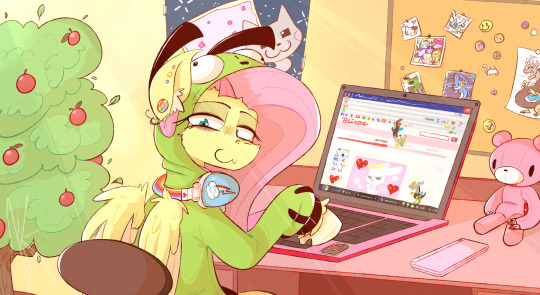
art by @voreburger
—
It has been one year since I released Antonymph. This song seriously changed my life and, it would seem, the lives of many others. I am grateful for the apparent impact it has had on people and I'm hopeful that the reach of its message will continue to spread.
I wanted to talk about how we got here.
Between the months of November 2020 and July of 2021, I experienced a gauntlet of emotional trauma, hardship, and declining physical & mental health. These things came after being newly out as trans, kicked out of my home by my family, transitioning from being a college student to a totally independent adult within the span of a month or two, moving away from my home of 21 years to somewhere I've never been before, and then trying to balance all this with the onset of COVID around the world. In January of 2021, all of these things adding up and weighing on me led me into this rabbit hole of thoughts about my life in the past, present, and future. Namely, though, I thought about my home in San Francisco, where I was far away now. I thought about the memories and things that made me who I was up until that point, especially the bad stuff. The whole project of CUTIEMARKS was an analysis of my life's mental struggles throughout my childhood and budding adulthood, examined through the characters of MLP:FiM.
And you know, it wasn't all everyone and everything else. Growing up, I had felt inclined to be a lot of negative forces myself. To be honest, I'm not precisely sure where it came from, and though I'm glad I grew from it, I still used to be that way. When considering a lot of the things of my past I encountered two things that would eventually become the hallmark reasons for creating Antonymph:
I was a dick to people. In so many ways, I was just an asshole for a lot of my life. I still kind of am sometimes, but I think everyone is. I really mean I was a cunt. This overinflated ego, this desire to shut people down for what they liked, this idea that I was always right and I know best about everything. I acted on this a lot and hurt a lot of people, even my closest friends (many of whom are still around me today, and I'm endlessly thankful they stuck with me through my worst).
I was also made to feel the same way, both directly and indirectly. I talked a lot about how it felt like there was pressure from the people closest to me to only like certain things and other things are not good enough to be enjoyed. This comes especially in the case of music, where it felt like there was a lot of disdain around me for pop and non-traditional music. This extended to all types of media though. I wouldn't have been caught dead being perceived as enjoying something like My Little Pony for a while.
So conceptually speaking, my desire to write something like Antonymph came as a rebellion against these things; against the ways I treated people and the ways I was treated.
At this point of my life, I had also recognized this sort of perpetual depression and negativity that pervaded me at all times. Any type of positive emotion would either be subdued or otherwise disappear within moments. It felt like I couldn't love things and I was always just clenching my shoulders preparing for things to hurt all the time.
So, back to January 2021. Sophie Xeon, a musician who I looked up to and felt comfort in, has just died. Very few celebrity deaths have ever affected me, but this one was very personal and intense. I remember going to bed shaking and feeling sick. It was an uneasiness I'll always be able to picture vividly in my head. In the spirit of her unabashed creativity and love for everything, I started conceptualizing a project that would be as bold as I felt she was.
The first, and only, title for this project was "CUTIEMARKS (and the things that bind us)".
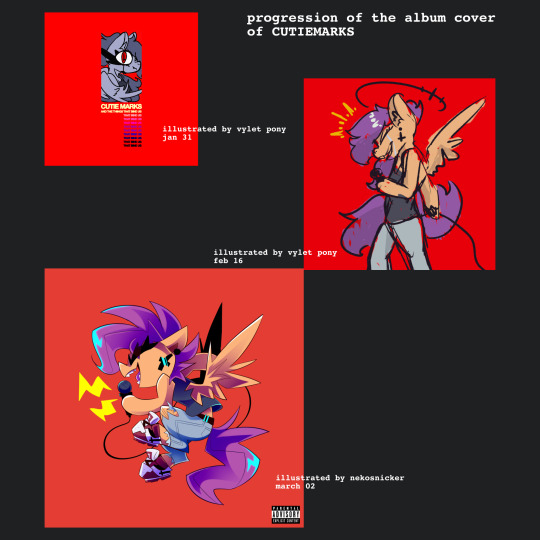
A deep dive into SOPHIE's work and her peers' work led me to examine the inspirations for PC Music. From there I rediscovered my love for the dancepop of the late 2000's and early 2010's. Carly Rae Jepson, Kesha, Katy Perry, etc. Around the time I started really using the internet, I secretly loved this music even though it felt like I was going against everything I was supposed to stand for at the time. I grew up in a cishet, Christian, potentially elitist music space. Things that evoked anything other than that induced guilt to enjoy. But I very, very, secretly, quietly, loved that stuff.
So I decided to make some synth patches that evoked those feelings
That's what led to this:
Once this demo was made, the path became rather clear for what I wanted to do. Around the time of the songs that inspired it, I was getting really into Tumblr and all the glittery, kitschy parts of the internet. I had been talking a lot with @voreburger (Pico) at the time of this and had a feeling he would be super into the idea. It started out as just wanting to have Fluttershy coming out of her shell with the help of internet culture. It was after pitching this idea to Pico that he sent me back a rough draft:
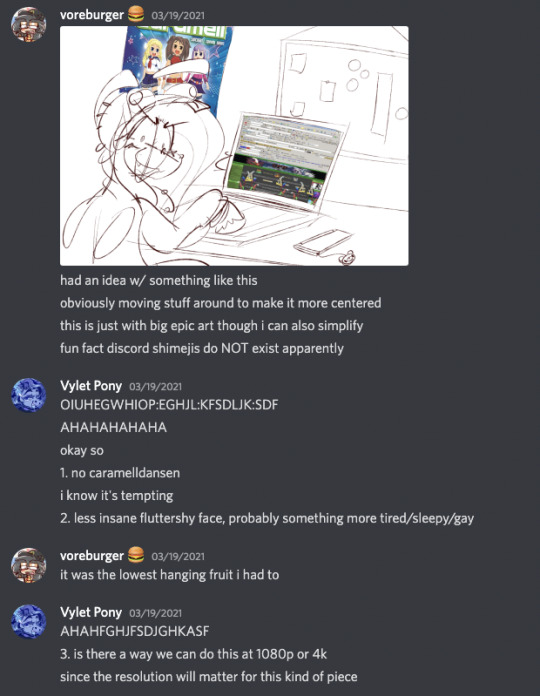
The idea was really coming together it seemed. What really drove it was his use of the Gir hoodie, really solidifying the internet time period(s) we were after. The Nintendo DS, the browser extension toolbars, and all that; he was onto something incredible.
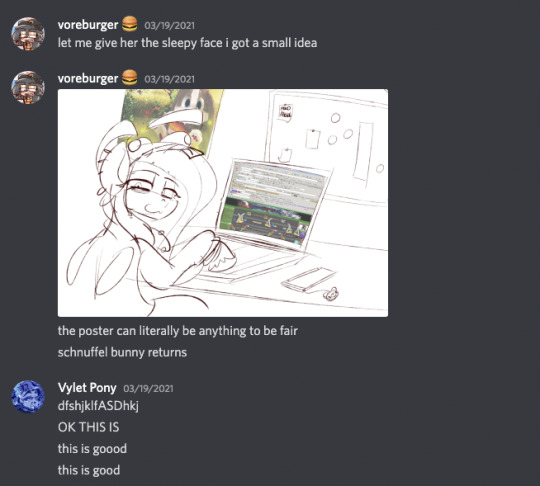
By the second draft, I still only had "Antonymph (demo1)" made on my end. Taking inspiration from the art he was doing, I started writing lyrics and programming some drums:
After I had these additions to ground the idea, I started getting more ideas for the art direction of the song.
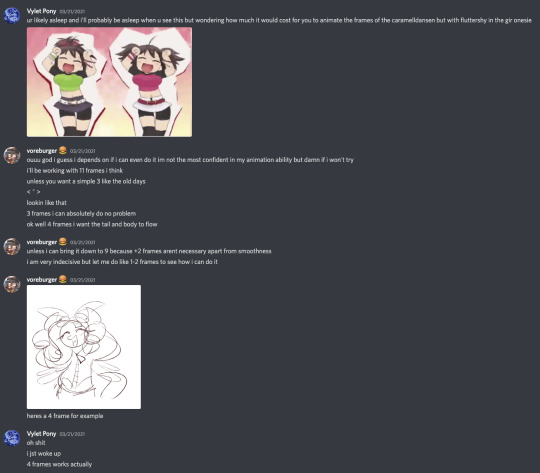
By this point I want people to understand how much Pico was instrumental to the conceptualizing and execution of this whole project. We bounced so many ideas off of each other and worked to string everything together. It wasn't a case of me commissioning him for a few things and calling it a day, it really wouldn't exist the way it does without him.
In order to test chroma key stuff, he sent this icon that he made.

It was here that I realized that Antonymph could be something bigger. There was now a few pieces of "Fluttershy in a gir onesie" that could be used for a semi-animated music video. I said to Pico the words "we'll create an entire culture around one song". That was essentially the manifesto, how deep I wanted this whole thing to go.
So I got to work. (This also appears to be the first mention of "Fluttgirshy" in our DM's)

youtube
I ran the lyrics by Pico in a group chat and we talked about the lyrical direction of the song. After coming up with some stuff together we ended up with demo3:
Between March, 2021 - May, 2021, I took time off from the Antonymph studio sessions for a few reasons:
The visual aspect of the project was now in full effect. I was messaging many of my favourite mutual artists and pitching Antonymph to them and explaining what I needed.
Focusing otherwise on lyrics.
I was working on the other CUTIEMARKS songs, now that the album was no longer a small EP project (which it was originally intended to be, as it always ends up with my music).
It was intimidating to work on Antonymph. It was very clear by this point that it was going to be a big project and a big song, likely to be heard by a lot of people. We all expected this from the start, though it ended up being even more than we imagined. Still, knowing this made it harder to work on the song because the pressure was really on.
Now at this point, many other concepts have been injected into the idea of Antonymph too:
Queerness needed to be a big part of this. Making a song about self acceptance and expression had to entail queerness (like many other aspects of CUTIEMARKS, anyway).
I wanted to help heal my homesickness a little bit, so the music video would start to include video clips that I took in California (most notably, the intro of the music video shows my BART route from San Francisco to Daly City).
I wanted my friends to be a part of it in some way. I couldn't include everyone, but I did a lot to make sure that the people I cared most about would be included in this project, knowing it would be seen by lots of people. I wanted to bring them along for this whole thing. Lots of clips in the music video include videos of my friends, and I took lots of suggestions about the song from friends in servers and group chats.
As a spiritual sequel to "Lesbian Ponies With Weapons", I wanted the song to speak to a lot of the issues our generation is facing around the world especially in the wake of civil rights and economic inequity.
Between May 17, 2021 - May 27, 2021 there were two more Antonymph demos:
After demo4, I asked friends and patreon subscribers if they wanted to be included in the song by way of putting a group of everyone saying "hell yeah" in the second verse. demo5 is where this first is implemented, but all the voices wouldn't be included until the very final version of the song.
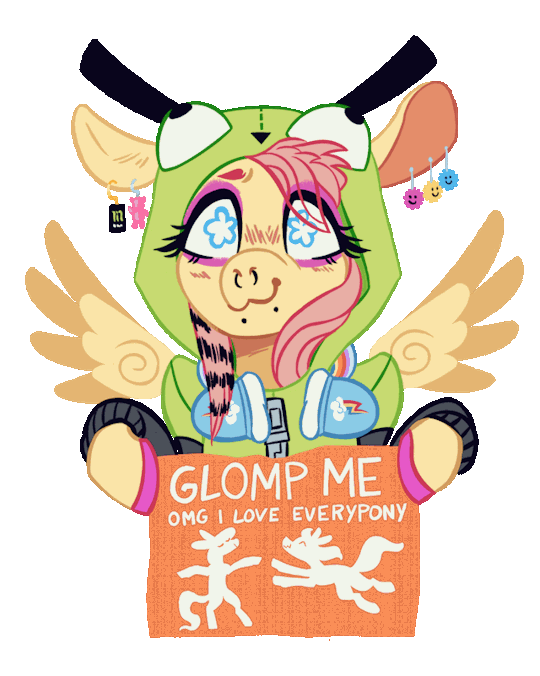
art by @sterfler / @uzon
Slowly but surely, everything came together. I worked endlessly on coordinating all the art stuff and doing the video editing and graphic design, until eventually:
It was done. February 24, 2021 - May 28, 2021.
I don't usually talk about finances, but I know for certain that the Antonymph project itself had costed well over $1.5k to make. This is disregarding everything else I had invested into the creation of the CUTIEMARKS album entirely, and is limited purely to Antonymph by itself. And as this project has helped to grow myself as a musician, I should be able to make more projects of this scope in the future.
A few days later, I premiered the trailer for it on June 4, 2021:
youtube
And then of course, what followed was the music video itself.
youtube
And just like that, it felt like I had taken my first breath of fresh air in a long time. I braced for the response to this, and what followed was extraordinary. Across social media, the #antonymph and #fluttgirshy tags were filling with people making fanart of the interpretation of Fluttershy that Pico and I, along with the many other incredible artists, spent many months getting just right. It all went to even inspire the parody project on SiIvaGunner's channel:
youtube
Antonymph was born from the ashes of my trauma and memories, and was forged between me and a dedicated team of incredible visionaries to become this thing that a lot of people connect with now. If I was going to put out a project of this scope and reach, I wanted to make sure it was positive and inspiring, and had the potential to live past its release as something that would continue to influence people for the foreseeable future.
So, Antonymph feels like a HUGE explosion of colours and emotions. And that's because it is. Everything had mounted up to that point. Endless amounts of hardship and mistakes, culminating into something that would be unabashedly beautiful.
I am forever grateful.
Thank you so much. + Thank you so much to Pico for making this project one of the best ever.
Oh, and as an extra special thank you, the stems to ANTONYMPH are now freely available to everyone: https://we.tl/t-j7WJ9dQ6tT
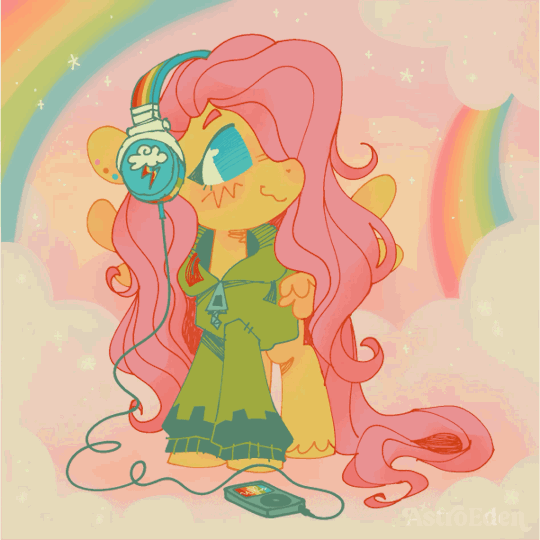
art by @astroeden, made specially for the one year anniversary of Antonymph <3
#vylop#vyletpony#vylet pony#my little pony#mlp#fim#friendship is magic#fluttershy#fluttgirshy#antonymph#cutiemarks#Youtube
792 notes
·
View notes
Text
REAL TALK- Living with Anxiety
originally posted to www.onlyfunthings.org on February 08, 2017


Ciao lovelies! Today’s post is another REAL TALK post, meaning it includes anecdotes, and some content not suitable for younger readers (possibly, depending on your sensitivities.) Today’s REAL TALK is about living with Anxiety.
I wanna start by throwing out some general statements to outline the general idea here. Anxiety is a real problem. Many children, teens and adults in America face it, in fact, 5.7 % of adults in the USA have severe generalized anxiety, 25.1 % of teens 13-18 have anxiety that lingers through their lifetime, and 28.8 % of adults have any kind of anxiety, with the average age of onset being a mere eleven years old. (source-https://www.nimh.nih.gov/health/statistics/prevalence/any-anxiety-disorder-among-adults.shtml thank you to the anon in the comments for finding the better link! ). Anxiety is a horribly prevalent disease, bordering on an epidemic. Yet many don’t talk about this subject, dismissing it as “just nerves” and the like. But Anxiety can really control and ruin your life. There are many different types of Anxiety, the most common being generalized and social.
I, myself, have Anxiety, and it is a constant challenge to overcome it to do the things I love.
I love to go to conventions and cosplay, but at first, my Social Anxiety made it impossible. I would have Anxiety and Panic attacks when going to conventions. I couldn’t go into the crowded dealers rooms and I certainly couldn’t ask my favorite cosplayers for a photo. My first few conventions were no fun because of my Anxiety.
But I wanted to enjoy my conventions. So I pushed myself into the situations that scared me. I even got to the point where I could host a panel!
Am I saying that you should force yourself into uncomfortable situations to overcome your Anxiety? NO. Anxiety attacks are horrible experiences that I wouldn’t wish on my worst enemy. The feeling of your chest tightening, the fight-or-flight response making your body shaky, the confusing and vulnerable headspace...It's awful.
No, to be honest, I don’t really know a healthy way to “overcome” Anxiety disorders. I know ways to help cope, however.
I personally prefer physical coping mechanisms. Things like fidget toys occupy my hands when they anxiously want to fidget, breathing techniques can help calm my chest, and even chewing gum can help curb anxious feelings.
When all else fails, I allot myself the time required to come down from an Anxiety Attack.
I also utilize ASMR videos to help with night time Anxiety, and insomnia and nightmares from Anxiety.
I think that everyone is different when it comes to what helps with Anxiety. There is not one universal method. But I encourage you to try out different methods! It may surprise you what works for you!
Here are some other techniques I’ve seen to cope with Anxiety and symptoms:
-Aroma Therapy: apparently, scents like lavender and citrus have been said to calm the mind. (Sources- http://www.healthyandnaturalworld.com/best-essential-oils-anxiety-depression/
http://info.achs.edu/blog/depression-and-anxiety-can-essential-oils-help )
-Herbal Tea: Teas like Chamomile and rose can help with Anxiety symptoms.
(Source- http://www.calmclinic.com/anxiety/treatment/healing-tea
http://www.naturalnews.com/043048_herbal_tea_anxiety_relaxation.html )
-Watching Slime Videos: Many people have said slime videos help with their anxiety. I have covered the rise of the “Slime Trend” before, but never really included any videos, so watch the video below to see if slime videos work for you!
youtube
-Coloring Books: Coloring books like these adult coloring books have surged into popularity as a tool for anxiety sufferers.
Please just know that you are not alone. Remember, 28% of American adults have some form of Anxiety. Talking about Anxiety and other mental difficulties has become much more socially acceptable now, so never feel afraid to talk about it.
Here are some more resources for Anxiety Sufferers:
How to recognize a panic attack
How to cope with a panic attack
Thank you all for reading, I’ll see you in my next post!
Stay strong and remember to love yourself!

#Youtube#agere#age regression#sfw agere#sfw littlespace#age regressor#sfw age regression#agereg#sfw little blog#age dreaming#agere art#agere community#age re safe space#age regression blog#age regression community#age regression sfw#age regressive#agere activities#agere aesthetic#agere blog#agere boy#agere board#age regression caregiver#agere caregiver#agere cg#agere games#agere lifestyle#agere little#agere moodboard#agere outfit
7 notes
·
View notes
Text
I am having a hard time getting older. I’m in my thirties but closer to 40 and I didn’t think I would ever care about it, but the depression is just debilitating. COVID definitely changed things for the worse. I don’t speak to anyone but my husband and my family because no one is ever in the office. My boss tells me one thing and then the complete opposite so even when I ask questions I get 5 different answers for the same question and then get chided for doing it wrong. I finish two hours in and spend my day doing nothing. It’s so hard on my disorder. I need structure. I would change but the job market is horrible right now. At least with my fics I had something to distract me and a group of friends to talk to, but I’m such a burden that I pretty much drove them all away. I don’t blame them one bit. I would be tired of me too. I feel bad that I even take up space. I’m an adult but still feel like a child. I don’t feel comfortable in my own skin and can’t bear to be in a room with most adults. I feel at any moment that someone will hurt me so I just don’t engage. I’m on the council at my church, but don’t feel good enough or smart enough for it. I just want to be 12 again and hide away in my bedroom before my disorder became onset. I’ve changed drugs so many times the past three years. The one I’m on now was working but gave me an allergic reaction.
Ultimately, life has been a struggle lately. If I could just interact with someone again—just try to be normal—it would help so much.
It feels good to get this all off of my chest. Maybe tomorrow I can try to write again and see if it helps distract me.
3 notes
·
View notes
Note
hi feel free to ignore but how do you feel about teens starting hormones? I feel like i see a lot of people (without kids mind you) always bashing on it but like.. i feel like o thought about that shit a lot as a teen and i definitely feel like it would've helped.. not sure what all the hate is about. Not to mention im pretty sure you have to have parents consent anyway if you're under 18, but idk why people think teens are incapable of making these decisions idk maybe this is dumb fjajfkskg
i started hormones at 14 lol
i’d been suicidal, clinically depressed, anxious, and self-harming since the onset of natal puberty. i’d also been in various forms of intensive therapy (including outpatient 3x a week and inpatient for 6 weeks) and on antidepressants and it became clear that it was really only treating my symptoms because the root cause of so much of my psychological anguish was my dysphoria. it had gotten to the point where i was so withdrawn that i was staying home from school and not doing homework and failing classes
and i’m not saying that hormones were a cure-all but within a year of me starting them i was doing sooooo much better holy shit
i generally think that if a kid can wait until they’re a little older (like 16-17) for irreversible medical intervention then they should, but not all kids can. i couldn’t.
and yes you have to have parents permission. you also have to have a shit ton of evaluations and get bloodwork done every 4-6 weeks for the first year you’re on hormones. they’re not handing the shit out like candy
in terms of what all the hate is about, people know that trans kids grow up into trans adults and they are terrified of that fact
18 notes
·
View notes
Text


𝐑𝐎𝐃𝐑𝐈𝐂𝐊 𝐏𝐀𝐆𝐄 (the preacher)
NAME. rodrick ignatius page
AGE. 42
TITLE. preacher
GENDER. he/him
HEIGHT. 6'7"
SEXUALITY. closeted homosexual
SIGN: cancer
MENTAL AILMENTS. guilt. cptsd. extreme anxiety. panic attacks. reoccurring major depression. seasonal depression. catatonia. late onset schizophrenia.
PHYSICAL. scars in the middle of both palms that go all the way through his hand from a botched crucifixion, muscle loss because of it and he struggles to hold things sometimes/has a running tremor when he's been over working his hand. chipped canine, broken leg that healed funny and causes him to over correct when he walks so his stride is much smaller in his right leg. bad back from being so tall. small, pale scars around his mouth from his accident with his grandfather at 7 and 11, but you likely wouldn't notice those unless he's in the sun or up close. scars along his ribs up to his shoulder's/along the backs of his thighs from the switch.
PHYSICAL APPEARANCE. rodrick is very much his daddy's son. his hair is always slicked back (until the heat and humidity hit) under a cowboy hat, he wears cowboy boots and a black pair of jeans to match his preaching shirt. rodrick only wears colors during special times of the year like lent or christmas and holidays. his boots are the most colorful thing about them as they range from nudie brand to boots with flames on them that amuse the children.
POSITIVE. humorous, charming, inviting, warm, gentle, great with kids, easily swayable, determined, loyal, funny, generous.
NEGATIVE. meek, coward, easily spooked, bit clingy, internalized shame that he carries everywhere, never makes the first move, goes through bouts of religious fever, drinks too much lemonade, naive.
FACECLAIM. hamish linklater
RESIDENCE. port eloise, louisiana
𝐁𝐀𝐂𝐊𝐆𝐑𝐎𝐔𝐍𝐃
rodrick was taken from his mother shortly after birth. he was a bastard, as was his own father, and he would grow up without a female figure in his life.
from the ages of 1 to 5, rodrick was a fairly normal, if a little shy, child. his father was the preacher for the port eloise catholic church and he was often seen between the grave yard and the funeral home on the page property. when he was 6, the abuse from his grandfather started. his grandfather had been a mean man to begin with but with the sudden decline of his mental health, he'd begun to show a particular disdain for rodrick.
he was too soft. god would not accept such a soft soldier.
he'd tried to toughen rodrick up. from the age of 6, he was subjected to hours of rigorous bible study supplemented with physical punishment if his voice had wavered, if his vocabulary was weak; there was no end to the punishments that his grandfather had subjected him to if he deemed it necessary.
rodrick's father often turned a blind eye to the abuse. he was also weak. rodrick sr. had seen to it that both his son and his grandson bent over backwards if he willed it and the trauma from both their lives impacted son and father.
when rodrick was 11, his grandfather beat him so severely that he hospitalized him. his crime? talking back. he'd taken his sweet time in putting on the boots he'd use to break his grandson's ribs with and when rodrick's father found him, it had been two hours since the initial attack and he was crumpled inside the front door between the porch and the screen door. the doctor from the next county over tells him that he's lucky his son is still alive.
rodrick sr. was hospitalized, as was roddy, and a rigorous investigation had started with child protective services. from that day on, rodrick never set eyes on his grandfather ever again.
his boogeyman was gone, but the rest of his childhood is deeply affected by the abused he'd endured.
as an adult, rodrick tries to undo the damage his father and his grandfather had doled out on himself and the community. his efforts to repair the relationship between himself and god is still a great struggle and he often finds himself praying, sometimes up to twenty times per day to forgive and forget.
but he doesn't forgive and forgetting is easier said than done.
12 notes
·
View notes
Text
So I'm still working on dismantling that one giant post from that one user, but I wanted to walk you guys through (and anyone reading this) how I and any mental health professional would go about reaching a diagnosis @martyreasemymind can chime in too as they are going to be familiar with this process.
So first off, these images are cut straight from the DSM-5-TR which is the most recent edition of the American Psychiatric Association's, Diagnostic and Statistical Manual of Mental Disorders, 5th ed. (DSM-5-TR)Textbook Revised, published 2022.
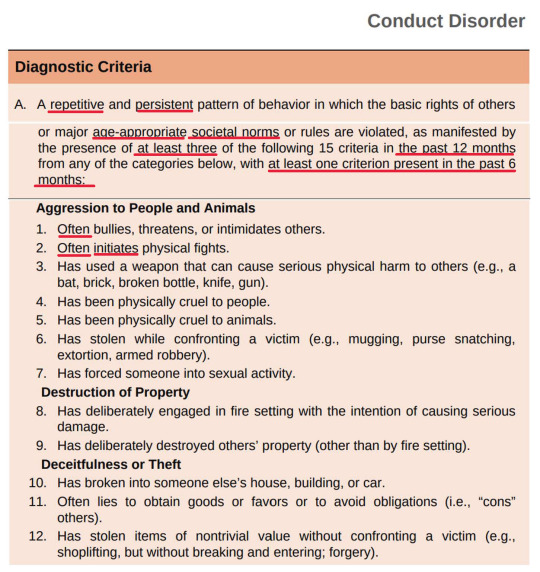
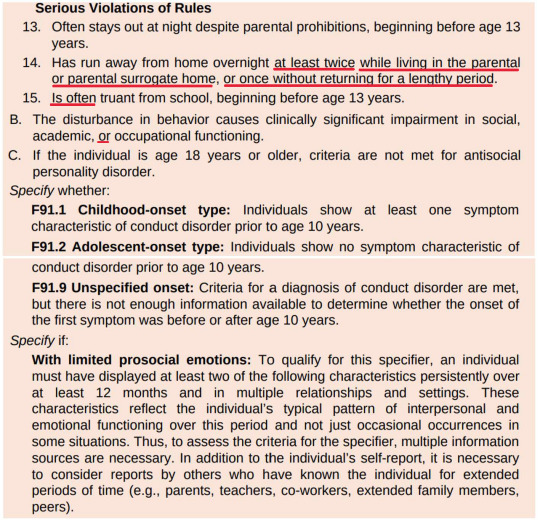
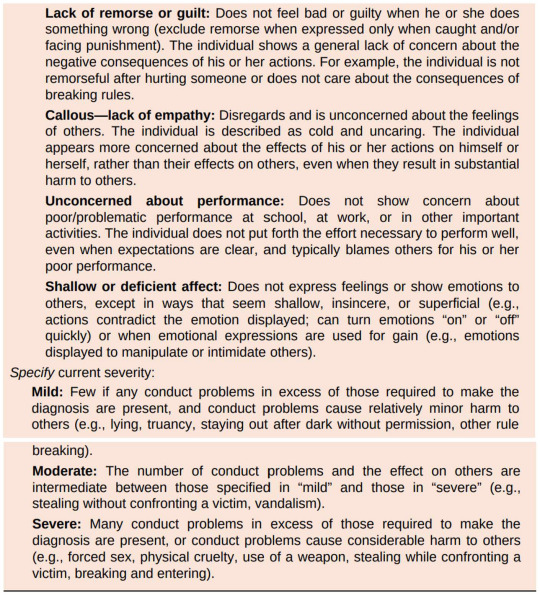
Now a tad bit of explanation, I have underlined in red the keywords to pay attention to when diagnosing. This goes for any diagnostic criteria, not just this disorder in particular. Things that one must always pay attention to are phrases that have to do with 1. onset (when did it start/how long ago did it start), 2. duration (how long has it been going on for/how long have their been symptoms/are there periods with none? etc), 3. frequency (how often is it happening?) & depending on the diagnosis you can also argue a 4. severity/impairment (to what degree does it affect the person's life/level of functioning?)
Now, the biggest things to keep in mind:
*I am only speaking for the American mental health and psychological diagnostic approach, in which I am being currently trained. I am peripherally aware of how some other English-speaking countries approach mental health diagnosis, but I am not versed in it, and it is not my place to make broad generalizations from the American approach to the British, Australian, Canadian, or other approaches, and so on. I am especially not well educated on how non-English speaking countries approach diagnosis. I can only speak to what I know.
Firstly, unlike the other user who was mistakingly relying upon Robert Hare's three-domain model of psychopathy as a basis to diagnose Conduct Disorder, the DSM should be used to diagnose mental health conditions. Not empirical journal articles, handbooks, or manuals on psychopathy that are designed to measure and assess for psychopathy rather than Conduct Disorder. Mental health clinicians can also diagnose using the International Classification of Diseases, 11th ed., (ICD-11) which to my knowledge tends to be the more widely used diagnostic standard outside of the United States.
Secondly, in order to diagnose, all criteria areas have to be met. That means that criteria in categories A, B, and C all have to be met. They each have to be independently be met. You can't just meet criteria for one section and call it a diagnosis. A, B, and C are the lead sections, they each have their instructions of how to meet minimum criteria. If minimums can't be met across all three sections, there is no diagnosis.
Thirdly, this particular diagnosis has some complex language for section A. On a lot of other diagnoses section A is usually more simple and just describes duration of symptoms (ex. Depression section A. person has experienced a period of low mood for at least two consecutive weeks.) Conduct Disorder's section A is very compound so let's break it into smaller bites. 1. repetitive - happens multiple times, but no specified number of how many times, 2. persistent - happens constantly, *note the OR in there 3. age-appropriate social norms - are these things that someone their age would be capable of doing/or do?, 4. rules - are these standard age-appropriate rules that someone this age would break/violate or does it go far beyond that?, 5. need at least 3 (or more) on the list below, 6. has to have been happening for a minimum of 12 months, 7. 1 of the present criteria can still count even if it's manifested only within the past 6 months.
What does this all mean in the plain man's English?
Let's use Johnny as an example, let's say he's 15/16.
Johnny has been experiencing repetitive and persistent difficulties concerning his conduct with peers and adult educators and staff at his high school. Over this past school year, Johnny has received three suspensions related to starting fights on school grounds, and he is currently facing expulsion after a pair of brass knuckles were found in his gym locker. He was described by his homeroom teacher as, "difficult", "defiant", and "a bully to others". When asked if he had friends, Johnny stated that he had some, but proceeded to describe his friendships in transactional terms. "Carlos is ok... He's my friend. He knows how to get the good weed. I still haven't paid him for it *laughs* loser..."
Johnny is currently involved with child services. A case was opened after he was found multiple times by the local police hanging out in local parks beyond curfew getting high. His parents have tried to talk with Johnny about this matter and that repetitive police interactions will not be good for his future, but Johnny laughs at them and tells them to "fuck themselves."
Just from this blurb alone I have had him meet all three main criteria A, B, and C. Can you decipher which pieces for A? Which parts of B does he meet and why? C I took care of for you, because he's under 18, and no one below 18 can meet that diagnosis...
Regarding specifiers:
This usually can be completed with reviewing client history through their files or by interviewing them and/or their parent.
–––––
Do I think Billy meets criteria for Conduct Disorder?
No. I believe he can account for maybe 2 (running away, lying to obtain things) criteria total in section A, if I had to pick a 3rd (staying out late). But I would attribute those 2 rule-violating behaviors as avoidant behaviors that then happen to violate rules. It's something that people with heightened anxiety and trauma-related disorders can venture into. (ie getting so stressed/worried about avoiding a test that one avoids school entirely; a rule violation). The lying is a maladaptive coping skill which probably does fall within conduct lanes, but 3 guesses where he learned it...
It cannot be said that he often bullies or often initiates fights because if this were a true client under consideration and we are using actual canon examples... One example doesn't equate to often. Often is typically considered as three instances or more.
A lot of Billy's behavior is arguably age-appropriate and it doesn't violate social norms or rules. It just violates Neil's rules... or those who are grossly misinformed about what teenagers are. 👀
His behavior has not risen to any heightened degree that it is getting in his way at school (suspension, detention, etc), it's not costing him friendships (tommy, carol, heather, whoever the mystery date was), it's not having any occupational impact (he got hired and he's personable enough that his boss is letting him do kid's swim lessons).
He does not meet criteria. At all. Not A. Not B. And not C.
*drops mic and walks off*
7 notes
·
View notes
Text
The 388-page report featured 32 recommendations on how transgender care should be conducted within NHS England. It incorrectly claims that there is “no good evidence” supporting transgender care and calls for restrictions on trans care for individuals under the age of 18, although it does not advocate for an outright ban. The report endorses the idea that being transgender may be caused by anxiety, depression, and OCD issues, despite the American Psychological Association, the largest psychological association in the world, rebutting this as lacking evidence. It also claims that transgender individuals can be “influenced” into being trans, a nod to the discredited theory of social contagion and rapid onset gender dysphoria, rejected by over 60 mental health organizations. Lastly, it seemingly endorses restrictions on transgender people under the age of 25, stating that they should not be allowed to progress into adult care clinics.
To support these recommendations, the report was released alongside “reviews” of the evidence surrounding transgender care, using these reviews to assert that there is "no good evidence" for gender-affirming care. A closer inspection of the reviews released alongside the Cass report reveals that 101 out of 103 studies on gender-affirming care were dismissed for not being of "sufficiently high quality," based on the Newcastle-Ottawa Scale—a subjective scale criticized for its flaws and potential unreliability due to a high risk of bias. This critique is particularly significant given the contentious political nature of the subject and connections between reviewers, Cass, and anti-trans organizations.
[...]
Immediately after the release of the Cass Review, experts in transgender healthcare from around the world voiced their opposition to its findings. Dr. Portia Predny, Vice President of the Australian Professional Association for Trans Health, criticized the findings and recommendations as “at odds with the current evidence base, expert consensus, and the majority of clinical guidelines worldwide.” Similarly, a statement from the Professional Association for Transgender Health Aotearoa condemned the review, noting, “The Review commissioned several systematic reviews into gender-affirming care by the University of York, but appears to have ignored a significant number of studies demonstrating the benefits of gender-affirming care. In one review, 101 out of 103 studies were dismissed.”
It is important to note that gender affirming care saves lives, and there is plenty of evidence to show for it. Numerous studies have demonstrated that gender-affirming care significantly reduces suicidality, with some showing a decrease in suicidality by up to 73%. A review compiled by Cornell University, which compiled over 50 journal articles on the topic, shows the efficacy of transgender care. These findings were echoed recently in an article published by the Journal of Adolescent Health, which found that puberty blockers dramatically lowered depression and anxiety. All of these studies and more have led to The Lancet, a medical journal with international acclaim, to publish a letter stating that gender affirming care is lifesaving preventative care. The largest and most influential medical organizations support trans care. A recent and historic policy resolution passed overwhelmingly by the American Psychological Association, the largest psychological organization in the world, states that gender affirming care is a medical necessity and that being trans is not “caused” by things like autism and PTSD.
49 notes
·
View notes
Text
Get Your Son Out of His Bedroom
Everyone has the general sense that people these days get out of the house and do less face-to-face socializing than they used to. The Atlantic’s Derek Thompson recently dove into the data available from the American Time Use Survey to figure out just how large this decline has been.
The answer? Very, very large.
American men are doing a third less face-to-face socializing than they did twenty years ago.
The drop amongst American teenagers is even more staggering: the amount of in-person socializing teens engage in has fallen by almost half since 2003.
Think about that for a second: today’s teenagers get together half as much as they did two decades ago.
Today’s teens are not only less likely to leave the house to see friends but to do other things like work, date, or play sports, too.
When it comes to the consequences of this trendline for young adults, the discussion typically centers on a rise in loneliness, anxiety, and depression.
But there’s another consequence that may be part of this fallout: fewer young men stepping into independent manhood.
Since the most primitive age of human history, it’s been observed that males seem to have greater difficulty maturing into adulthood than females. Various theories have been put forth as to why this may be so, from the biological (females receive a more significant signal of maturation in the form of the onset of menstruation) to the psychological (boys must not only differentiate themselves physically, but also in terms of identity, from the female body — the maternal womb — of which they were once a part).
Whatever the cause, boys have typically been given a greater outward nudge towards embracing mature roles and responsibilities. Traditionally, this nudge took the form of rites of passage — a practice common in every age and across every culture in the world.
From time immemorial, boys have felt the tension between two impulses: One, the desire to stay in the safety and comfort of the domestic sphere, taken care of by their mother and free from difficult and dangerous responsibilities; the other, the desire to take risks, to explore, to win honor, to adventure — to take a place in the world of men.
The rite of passage, dictated by their community, compelled young men to overcome the inertia of the first impulse to embrace the second.
Today, rites of passage — going to college, traveling the world, participating in a mission trip — are still possible, but the decision to undertake one, rather than being subject to communal forces of shame and honor, is voluntary and individualistic.
This has been the case for a very long time now.
But the ratio between the gravitational pull toward one’s childhood orbit and the attraction to the world beyond its borders has never been more lopsided.
The time teens spend leaving the house and getting together with others really started to dip after 2010, when smartphones began to proliferate. Technology has provided everyone with a simulacrum of the kind of entertainment, conversation, and exploration that formerly could only be accessed by venturing into the outside world. There’s less incentive to leave the house and more enticement to stay at home.
When I graduated from high school, I couldn’t wait to go to college and get out on my own. Anecdotally, the young men I know now are less enthusiastic about this transition. And this hesitancy about striking out on their own could have a big impact on their maturation — on their ability to develop the qualities that make for an autonomous, self-reliant, happy adulthood.
In staying within the domestic sphere, the childhood orbit, you’re more protected from the judgments, the risks, the slings and arrows of the wider world — the things that catalyze growth, build strength, and develop character. When you conduct all your communication through a digital device, you can carefully script everything you say instead of engaging in the dangerous dance of improvisation. When your parents are always close by to back you up, you’re never… http://dlvr.it/T3L3jc
4 notes
·
View notes
Note
could you tell us about question 7 in the ask game? Also 1 if that's ok.
Hi! Yeah, of course! No problem at all =D
Question #7: What's a struggle you wish more people talked about?
Oh, there's honestly so much. I wish more people talked about the struggles and importance of accessible household items, I think. I don't think people talk enough about how accessibility is really important when considering buying certain things.
For instance, I struggle to open the handle at the house my family and I live in. We bought our new house a few years ago, and we couldn't change the handle. My parents have been intending to change it, but they haven't.
We are also currently looking to get a new vehicle, which means we have to check how accessible it is for me. How hard it is getting in, how much leg room I have, where the handles are, and how easy it is to handle/drive.
Accessibility is about more than ramps and wheelchair accessible vehicles. Even though I don't 'look disabled' (whatever that means), I still have to consider accessibility wherever I go and anytime I'm looking at something new.
It could simply be the difference between squeezing a tacky glue bottle vs. squeezing an Elmer's glue bottle, which is a struggle I have dealt with. Tacky glue bottles are CONSIDERABLY harder for me to use due to wrist strength than Elmer's glue is.
It's as simple as needing someone else's help to put on a fitted sheet, or having glass containers that are hard to open. I don't 'look disabled', but I am. And because I deal with wrist pain and my disability affects my wrists, it leads to issues with wrist strength.
So while there are many struggles I'd like to hear about more, I think that is my choice.
Question #1: What disability/ies do you have? (and are they mental, physical, or both?)
I have one diagnosed disability. I believe I have some undiagnosed ones (autism, ADHD, anxiety, depression, c-PTSD and/or PTSD, either celiac or non-celiac gluten sensitivity, and hyperthyroidism).
But for the sake of accuracy, I am only going to explain my diagnosed disability =)
I don't think I have gone into full on detail of what my disability is, even on my main blog. I honestly can't remember.
I have an autoimmune disease called RF (rheumatoid factor) negative polyarticular juvenile idiopathic arthritis. Because I am 20, this would (I think) be referred to as juvenile-onset arthritis, but again, for the sake of accuracy, I am going to give the diagnosis I have on my medical record. By 'juvenile' it means that it is diagnosed/occurs when someone is 16-17 or younger.
Polyarticular means 5 or more. This means that at least five joints in my body are affected by my arthritis. In my case, I have arthritis in every single joint in my body.
It affects my neck, jaw, spine, collarbones, ribs, shoulders, elbows, wrists, fingers, hips, knees, ankles, toes, etc. All of it. Pretty much my entire skeleton is affected. I mostly tend to have problems with my knees, jaw, and wrists. But they are all affected. Because of my disability, I do deal with chronic pain. I struggle when walking sometimes, though I often push myself due to familial expectations, and the fact that I don't like 'complaining'. I also can't stand for long periods of time because of my disability.
My disability is physical. It is mobility related. My disability is categorized as a physical disability, an autoimmune disease, a chronic illness, a musculoskeletal condition, a connective tissue disorder, and a mobility impairment, which is honestly a mouthful XD
I think my arthritis has affected other parts of my body that don't inherently have to do with my joints (potential livedo reticularis on my legs, watery eyes, etc.), though because those aren't confirmed, I just went with what the condition is said to cause (the other issues might be caused by RA, which I am technically not diagnosed with [though I feel like I might have seronegative RA, which would just end up being the more adult type of the JIA I have])
Thank you for the questions!
#physical disability#cripple punk#cripplepunk#crip punk#cpunk#physically disabled#physical disabilities#juvenile idiopathic arthritis#juvenile arthritis#arthritis#auto immune disease#autoimmune#invisible disability#disabilities#ask game#chronically ill#chronic illness#chronic pain
9 notes
·
View notes
Text
A Thousand Times
It has been a while since I have posted, but today I wanted to share. Things have not been going well for quite a while. Today is Monday, and I am not at work.
Early last week, I woke up and thought, “I can’t do this today.” Then I got up and went to work, because for the past decade whenever I have heard myself say, “I can’t do this today,” I have done it anyway. I would estimate I’ve had that thought a thousand times since I started med school. Not one of those times did I believe me. Every time I would respond with some variation of, “you have to.” Now I see that I was right, though. Even though I did what I said I could not do a thousand times, I was breaking in slow motion. Every time I did not listen to myself, I developed a new hairline crack. It didn’t keep me from functioning, that day. Indeed, I accomplished the often-unstated but always-obvious objective of learning to perform at a very high level while ignoring my every physical and emotional need. But the day would eventually have to arise when all of the cracks would result in collapse. Some part of me could see that, and was telling me very clearly, but the rest of me refused to accept that I have limits. I started out so strong that I couldn’t recognize fragility.
The past year or so has seen an obvious decline in my mental health. Really, moving into my fixer house while simultaneously recovering from major surgery was the beginning, but that anxiety felt very situational and largely related to my dawning realization that I could not rely on solidarity from my partner. Then the delta wave happened, and the traumas at work caused me to start having panic attacks. Those were impossible to ignore, and I knew then that I needed help. I started therapy, and regular meditation, and ultimately meds. I felt I was getting better, and then I watched one of my best friends die; I helped make the decision to extubate her and was alone with her when she took her last breath. In the aftermath of that I continued to struggle with my partner, and every bad day felt worse than the last. I careened into depression like a little plane with its engine on fire, crashing into a forest. Every day became an “I can’t do this today” day. I kept doing it. After months of his attributing all of our problems to my poor mental health, my partner then told me that he thought I was making it all up to manipulate him. I will never forget the abject despair that I felt when he said that. I maxed out my vacation time and went to Montana with three wonderful women, who watched me drag myself through our days with concern. On the drive back home I spent the long, bleak hours trying not to think about suicide. Trying not to think about something feels an awful lot like thinking about it.
On Wednesday I had a dentist appointment for a routine cleaning. I was having an anxious morning and really didn’t want to go, but counterpoint: adult. I have had a lot of painful dental work done in my life and part of why I like my dentist is that they’ll basically give you (well, sell you) nitrous for anything even remotely uncomfortable. She asked if I wanted it for this cleaning and I said no. I did want it, but I felt silly accepting (and paying for) an anesthetic when I knew I was just getting a cleaning. As soon as the dentist started probing I realized I had fucked up. The pain was simultaneously minor and intolerable. I thought about my patients, and how I tell them all the time that anxiety and depression magnify pain. In that chair, I fully understood what I had been talking about.
The dentist noticed that I was jumpy and she asked how I was doing. That question felt impossible to answer, and I began to have the chest pressure that I have come to recognize as the onset of a panic attack. Tears started running down my face and I was breathing hard, and I saw both of them realize that I was now A Whole Situation. I have been the professional on the other side of A Whole Situation, both caring about the person who is struggling and also knowing that I have limited time and resources and that this has the potential to derail my day. They were very kind, and I was very embarrassed. The hygienist suggested that maybe I actually did need the nitrous, and offered to get that going if I wanted to proceed. I should have just rescheduled, but because of my refusal to believe, “I can’t do this today” I stayed and accepted the nitrous. I was congested from crying and the little nose mask was uncomfortable to use, but the nitrous did help and I got through it. As I lay there tripping on residual panic chemistry combined with that silliest of drugs, I recognized that I was losing the ability to function.
The next morning as I climbed into the tub before work, I found that I was dissociating. I hadn’t had a good sleep in I don’t know how long, and I could barely manage the mechanics of showering. I thought about my full clinic schedule and started to panic again. I tried to imagine getting through the day, and wondered if I could avoid making any decisions about medications, because doing even the most basic math seemed impossible. In that moment, it was very clear that I was no longer safe to practice medicine. I had been monitoring for that, and was certain I would be able to recognize if I had crossed that line. On Thursday, I crossed it, and now I’m out on FMLA. A thousand mornings later, I couldn’t do it.
Today, four days after that, I am contemplating kintsugi. I don’t know if this pile of dust can be reassembled into something whole. It may have to be kneaded into fresh clay and made into something new. For now, my primary task is to listen to my whole self and believe what I am saying.
31 notes
·
View notes
Text
Chapter 3 of Schizophrenia, Third Edition: Child and adolescent schizophrenia
Although it's rare before the age of 10, childhood and adolescent schizophrenia does happen. Things like clinical severity, impact on development, and poor prognosis calls for a need of early detection, prompt diagnosis, and effective treatment. Childhood/adolescent onset schizophrenia is associated with poor premorbid functioning and early developmental delays, which is particularly striking for people with onset before adolescence. Similar impairments have been reported in adult-onset cases but are more common in child/adolescent-onset cases. These premorbid impairments may be a risk, or a precursor to psychosis. Diagnoses like anxiety, depression, ADHD, and autism may precede the diagnosis of schizophrenia in children and adolescents.
People who develop schizophrenia typically go through a prodromal phase characterized by a marked decline in functioning. Things like social withdrawal, decline in school performance, and uncharacteristic and odd behavior begin on average a year before the onset of psychotic symptoms. In retrospect things like non-specific behavioral changes were frequently early negative symptoms well before positive symptoms showed. Prodromal symptoms may also include odd ideas, eccentric interests, changes in affect, unusual experiences, and bizarre perceptual experiences. While these are characteristic of schizotypal personality disorder, in a schizophrenic prodrome there is usually a progression to a more severe dysfunction.
Child and adolescent-onset schizophrenia is characteristically chronic, with only a minority of cases making a full recovery. If full recovery does occur it is most likely in the first three months, and Hollis (1999) found that 12% of cases of schizophrenia only reached full remission. A Maudsley study found that those who were psychotic after 6 months have a 15% chance of full remission, while over half of cases who made a full recovery had active psychotic symptoms for less than 3 months. This indicates that observation past 6 months adds little new information, and the course over the first 6 months is the best predictor of remission.
A number of long-term follow-up studies of child and adolescent-onset schizophrenia all describe a chronic, unremitting long-term course with severely impaired functioning in adult life. Roughly one-fifth of cases in most studies have a good outcome while at the other extreme one-third are severely impaired. After the first few years of the illness there is little evidence of further progressive decline. Third, child and adolescent-onset schizophrenia has a worse outcome than adult-onset schizophrenia and affective psychoses. Social functioning is also very impaired in early onset schizophrenia. These findings confirm childhood schizophrenia is at an extreme end of a continuum of severity.
Cognitive symptoms of schizophrenia are increasingly being acknowledged as core features of the disorder. The degree of cognitive impairment is greater in child and adolescent-onset than adult-onset cases, which raises several questions. Are cognitive deficits specific or general - are some areas more affected? Which deficits precede psychosis and could be causal, and which are consequences of psychosis? Is it specific to schizophrenia or is it common between other developmental and psychotic disorders? Are cognitive impairments progressive or static after the onset of psychosis?
In summary of the findings: sensorimoter skills, associative memory, and simple language abilities are preserved in children with schizophrenia. Bigger decifits include tasks that require sustained and focused attention, flexible switching of cognitive set, high-information processing speed, and suppression of prepotent responses. These cognitive processes are executive functions, necessary for organizing goal-directed behavior.
Assessing a child or adolescent with schizophrenia should include detailed history, mental state and physical examination, and laboratory tests. Usually physical exams include a full blood count and biochemistry, including liver and thyroid function and a drug screen. Progressive structural brain changes indicate value in getting an MRI. Antipsychotics stay a cornerstone of treatment of schizophrenia but treatment should take a multimodal approach including pharmacotherapy, family and individual counselling, education about the illness, and provision to meet social/educational needs.
#nerdpost#graypost#psychology#psychosis#schizophrenia#long post#book: schizophrenia third edition#childhood schizophrenia#adolescent schizophrenia#early onset schizophrenia
4 notes
·
View notes